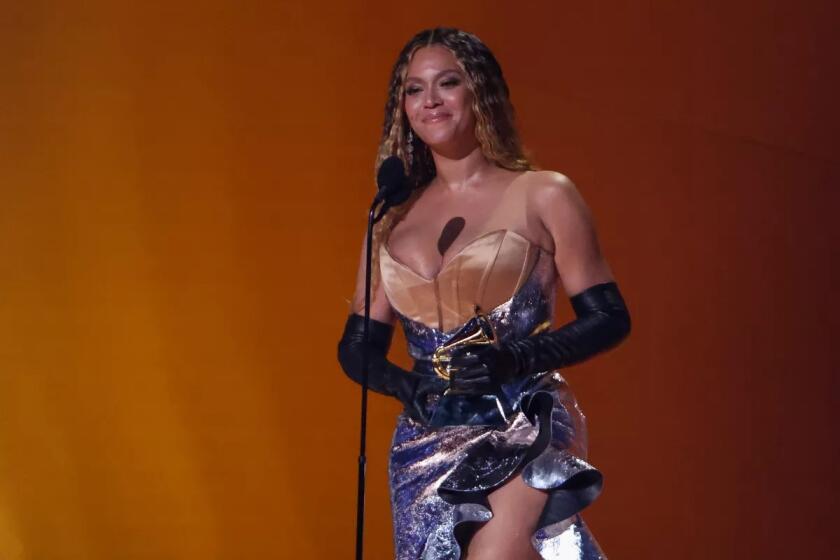Low-Profile Pop Singer Has a Solid Reputation
- Share via
It was a phenomenon called the ‘70s, an era between the firestorms of the countercultural ‘60s and the punk-cum-New-Wave pore-cleansing of the ‘80s. It has been called a transitional period, but hindsight is suddenly changing its perception, and ‘70s lore (and kitsch) seems to reign supreme, from the Brady Bunch to Acid Jazz to lurid fashion palettes.
The ‘70s renaissance also includes a newfound appreciation of the jazz-inflected, blue-eyed soul represented by the likes of Michael McDonald. But he wasn’t alone.
Sneaking into the pop music atmosphere from some dim-lit corner was Bobby Caldwell, nowhere near as ubiquitous as McDonald, but influential nonetheless. Hear him at the Ventura Theatre on Saturday night.
In 1978, Caldwell captured the public ear with a beguiling ditty called “What You Won’t Do for Love,” marked by a cyclical lyric hook and a simple but memorable horn part. It has become his signature tune, covered by countless artists, including the British soul-popping band Go West, and sampled by yet more.
He has since penned songs for various pop artists, including the Peter Cetera and Amy Grant smash single, “Next Time I Fall,” and has also released albums on the small Sin-Drome label.
The latest of his own projects is last year’s “Soul Survivor,” a tasty blend of originals and reworked soul tunes of yore, all sung in his handsome, Stevie Wonder-esque vocal style.
In recent years, Caldwell has found a happy home on the adult contemporary scene, alongside the hot-tub jazz artists. But his music is, in a way, more honest than his airplay peers.
The world’s Kenny G’s have more to do with instrumental pop than jazz aesthetics, but Caldwell is true to a brand of R&B-pop; hybrid that goes down easily and is lined with touches of sophistication.
Caldwell seems generally to prefer life behind the studio curtain and songwriting drawing board rather than being in the show biz spotlight. His album covers resist the standard practice of featuring the artist’s picture. He was a no-show for an interview planned for last week, and he declined to respond to requests for a makeup session. He’s a mystery man in a world of glory-seekers.
But no matter: Caldwell’s pop-soul heart is in the right place. The ‘70s were very good to him, and vice versa.
*
* Bobby Caldwell, 8 p.m. Saturday at Ventura Theatre, 26 S. Chestnut St., Ventura. Tickets: $18.50; 648-1888.
Carrying the Free Torch: Another brand of Bobby, entirely, is coming to Santa Barbara’s Jazz Hall on Saturday night. Trumpeter and cornetist Bobbie Bradford is, by now, one of the most valuable players in the Los Angeles jazz scene, even though he is ever underappreciated. He’s a jazz hero deserving much wider recognition.
Bradford was born in Cleveland, Miss., in 1934 and grew up in Dallas. He landed in Los Angeles in the ‘50s, and wound up playing with the likes of Eric Dolphy, Gerald Wilson, but, more significantly with some fellow Texans, clarinetist John Carter and saxophonist-jazz icon Ornette Coleman.
His stint with Coleman during the ‘60s went largely undocumented, although he appeared on Coleman’s early ‘70s albums, “Science Fiction” and “Broken Shadows.”
Bradford’s relationship with Carter, however, was a deep and lasting one. Together, in various groupings over the decades until Carter’s death in 1991, they represented the visionary Jazz Left in a town that, where jazz is concerned, usually thinks right.
One of Bradford’s distinguishing marks is his elegant sense of phrasing and tone within a largely free jazz framework. While other improvisers often favor frenetic style over grace, the gentlemanly Bradford’s playing is marked by poise and wry humor.
Among Bradford’s best recent recordings is one that also has a local angle. Former Santa Barbara trombonist and Westmont College jazz teacher John Rapson, who went back East to study at Wesleyan University several years ago and is now based in Iowa City, has released a captivating new album, “Dances & Orations,” on the Music & Arts label.
Concept runs strong here: In a twist on standard jazz practices, Rapson recorded a long improvisation with Anthony Braxton, then transcribed it and cobbled together a compositional structure from the material. Thus, improvisation begat composition, rather than the other way around.
Rapson brought the music to Los Angeles to record with some old cohorts, including Bradford, whose role is central to the success of the whole. His brass textures are alternately exploratory, testimonial and wise. Expect the same when his quartet makes a rare appearance up the coast Saturday.
* Bobby Bradford Quartet, 8 and 10:30 p.m. Saturday at the Jazz Hall, 29 E. Victoria St., Santa Barbara; 963-0404.
More to Read
The biggest entertainment stories
Get our big stories about Hollywood, film, television, music, arts, culture and more right in your inbox as soon as they publish.
You may occasionally receive promotional content from the Los Angeles Times.










